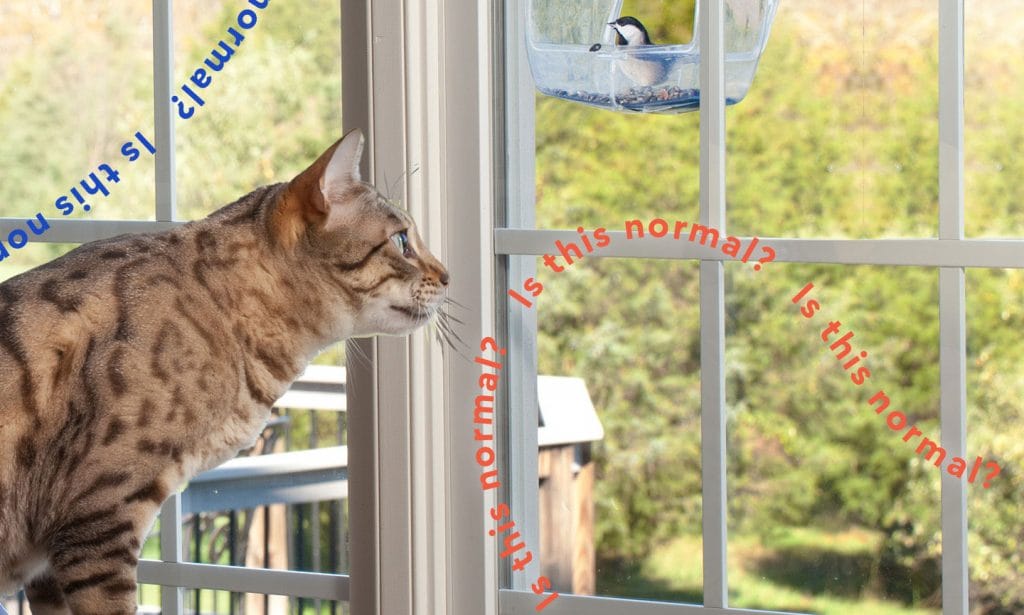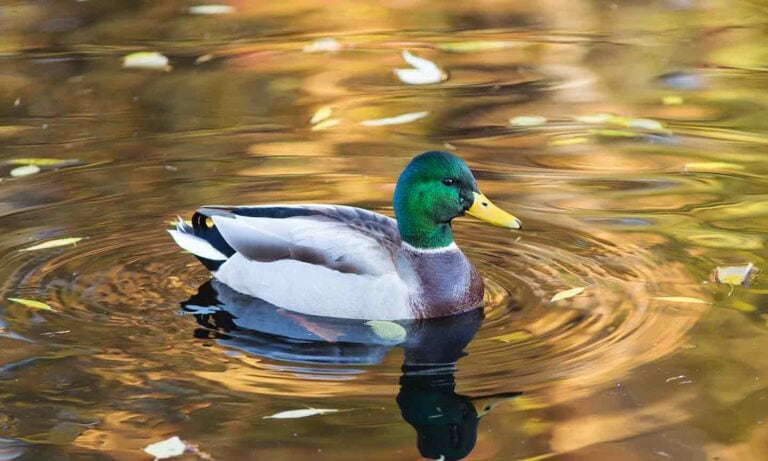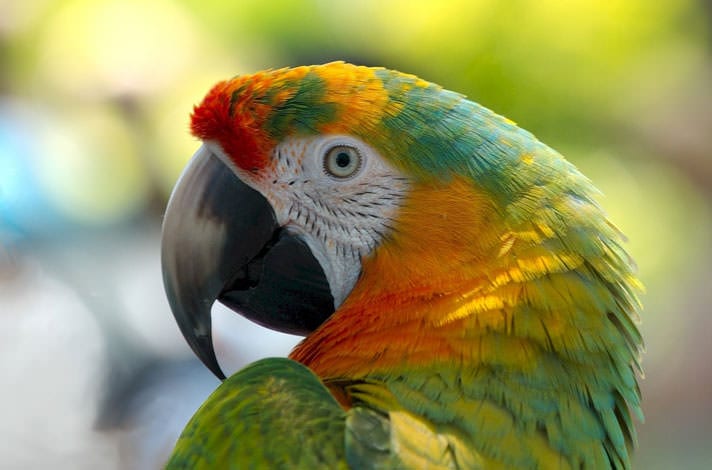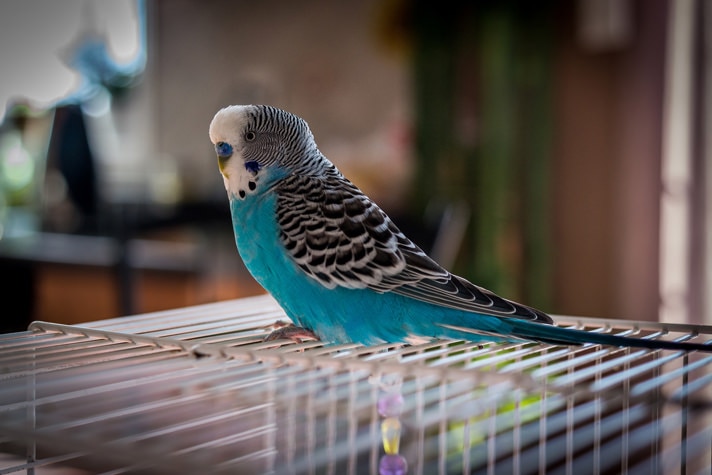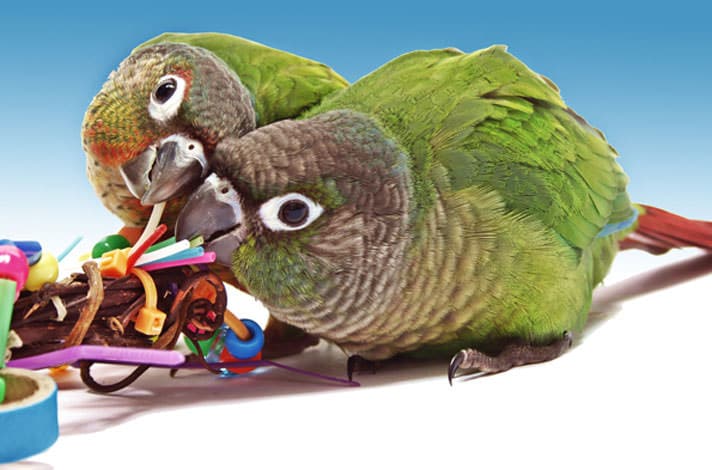Q:I’ve noticed my cat will sometimes make these weird noises when she sees birds outside the window. It’s sort of a rapid-fire chattering, chirping sound. Why do cats chirp at birds? Is this normal?
Cats chirping at birds mainly has to do with the fact that cats are (gasp!) predators and birds are their prey. Basically, it’s their natural hunting instincts kicking in. So yes, it’s normal. And not only that, but cats chirping at birds should actually be encouraged.
If you’re a cat parent, you may have seen your cat chirp at birds before. This type of cat chattering can also be directed at other small animals like squirrels or chipmunks. If you’re wondering why cats chirp at birds and other animals, you’re certainly not alone. We tapped several feline behaviorists to get to the root of this seemingly weird cat behavior.
Why Do Cats Chatter or Chirp at Birds?
There are a number of reasons why cats chirp at birds and other animals, according to experts.
They’re mimicking bird sounds.
Many cat behaviors are what Mieshelle Nagelschneider, certified cat behaviorist and founder of The Cat Behavior Clinic, calls Darwinian-evolved, “survival of the fittest” behaviors, and this trilling meow sound they make may actually help them capture their prey.
“It may be a way of mimicking the bird to entice it to come closer,” says Nagelschnieder, who hosts the TV show “My Cat From Hell” (China version).
This behavior is also seen in large, wild cats. Ingrid Johnson, a certified cat behavior consultant and the owner of Fundamentally Feline in Atlanta, Georgia, says that our housecats’ much larger and wilder counterparts, like cheetahs and mountain lions, are known to chirp or chatter in nature.
(See what we mean here.)
They’re excited.
Another reason why your cat may chirp or chatter at animals outside? Sheer excitement—of a potential snack!
“Cats are really excited when they see a bird or squirrel and they want to get their mitts on it,” says Dr. Marci Koski, Ph.D., a certified feline behavior and training consultant and owner of Feline Behavior Solutions in the upper Northwest. “That excited energy can result in this chattering sound.”
Nagelschndier likens it to your mouth watering when looking at a delicious dessert before you take a bite. “The teeth chattering together is the closest the cat can get to having the prey in its mouth and quickly biting down on it.”
Yikes! Sometimes we forget our cats are natural born predators (we say as we sprinkle cat nip around their luxury cat beds like rose petals).
When your cat chirps at birds or other prey, Johnson says there’s also a chance it could be an involuntary reflex that happens secondary to excitement.
“They’re so stoked to see that bird outside their window, and it’s their way to exercise that excitement so they don’t scare the prey away or rush after it prematurely,” she explains.
They’re frustrated (but in a good way).
If you think your indoor cat is chirping out of frustration or anxiety because they can’t catch their prey outside, Nagelschneider says not to worry. “An important thing I tell [cat parents] to remember is that out in nature cats do not catch their prey all the time. Not even close.”
In fact, Nagelschneider says that the most exciting part of the hunt for cats is when their prey hides and it becomes a more challenging experience. “This activates what is called their ‘seeking circuit,’ which is in the reward circuitry of the brain and the best feeling for cats,” she says.
So even if your domestic cat is chirping at squirrels or birds outside, it may not be out of frustration—but rather enthusiasm and entertainment. Johnson adds, “They’re watching kitty cat TV through the window—and they’re pretty engaged with what they’re watching.”
They’re initiating their “prey sequence.”
If your cat gets excited about birds and squirrels outside windows, this can initiate something called their “prey sequence,” or a series of behaviors that cats perform when they hunt.
The first step of this prey sequence, Dr. Koski says, is staring at prey animals and getting excited (this is where your cat’s chirping or chattering might come in). The second step is stalking or chasing, then comes pouncing or grabbing, and lastly comes the killing bite.
Though you may think of your house cat as an adorable fluffball who loves to take long naps and bask in the sun for hours at a time, Dr. Koski says all cats are “wild carnivorous beasts, so it’s really important to give them an outlet for those instinctual habits.” One way to do that is to invest in some interactive toys, like a wand they can chase. Learn more about interactive toys here.
It’s a (literal) killer reflex. #sorrynotsorry
OK, get ready to cringe. Speaking of the killing bite, Johnson says that the chirping vocalizations cats make essentially “mimic the action of the jaw or the motion of what [cats] would do when they sever the spine and snap the neck of their prey.”
As creepy or unsettling as that may be, it’s totally normal. Johnson explains that this type of mouth movement is controlled by your cat’s motor system and is actually an involuntary reflex.
“Their jaws move so quickly like that because they’re enthusiastic about catching the kill and killing it—and how they do that is by snapping their necks. [This chirping] mimics the motion of the kill portion of the predatory sequence,” she adds.
Should You Be Concerned?
The good news? All three cat experts agree that cats chirping or chattering at their prey is completely normal and nothing to worry about. In fact, they all believe you should encourage your cat’s chirping noises! (Learn how to do that in the section below.)
“There’s nothing to worry about,” Johnson assures. “This is totally normal and adorable—give them a chance to be enriched and engaged.”
So even if your cat is making strange noises while staring at birds or squirrels outside, you don’t need to stop or redirect the behavior. “Trying to stop a cat from this behavior would be like trying to stop a bird from singing or building a nest. It is completely harmless and an evolved genetic trait in cats,” says Nagelschneider.
Furthermore, removing your cat’s outlet for performing their natural prey sequence can cause them to become stressed. Dr. Koski says it can cause behavioral issues such as “pent-up energy, frustration, or aggression towards people or animals in the household.”
How to Encourage Cat Chirping
If you want to encourage your cat’s prey sequence at home (which all three experts recommend you do!), there are several things you can try.
- Give them a great view of the Great Outdoors. For starters, Johnson recommends that cat parents “put cat condos near big open windows, put up squirrel feeders or bird feeders and let your cat have the opportunity to watch TV!” She adds, You could even get a window-mounted perch for your cat to give them a front-row seat for bird watching.
- Up your daily interactive play sessions. Johnson says, “All cats should have several interactive play sessions a day—especially prior to a meal. Playing with your cat before you feed them is ideal because it mimics that predatory sequence of hunt, stalk, catch, kill, eat.”
- Make them work for their food or treats. Engage their minds with food puzzles, like this one from OurPets, or other treat dispensing toys. These types of products make your cat work for their food or treats like they would in the wild. Though they’re not exactly hunting prey out in the savannah, it will still simulate the experience and give them a source of entertainment.
- Invest in a variety of toys that bring out their killer instincts. Providing different chaser toys or wand toys—especially wands with changeable clips like this one—can help keep your cat stimulated. “Variety is the spice of life for cats," Dr. Koski says. "They don’t hunt or get excited by just one thing. If you eat pizza for two weeks straight, you’ll never want to eat pizza again. You’ll want to rotate those lures to keep it fresh and exciting.”
The Bottom Line
Cat chirping can occur when your cat is excited, entertained, or ready to hunt. It’s not only a normal behavior, but it’s also a good sign that you have an engaged and happy kitty! If you’ve never heard your cat chirp or chatter at prey, but want to encourage their hunting skills, there are several things you can do. Try incorporating more interactive play each day, invest in some lure or wand toys to simulate their prey, move your cat’s bed closer to a window that looks outside, and challenge your kitty with some food puzzles or foraging toys. Before you know it, you just might hear some happy cat chirping noises!Like this story? Check out more of our favorite reads:
Share:
